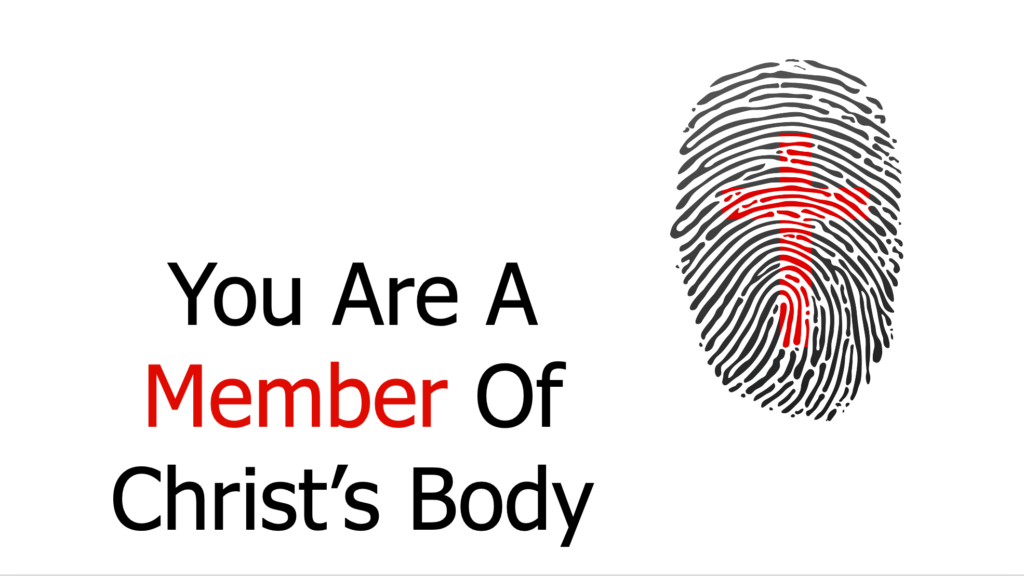Download:
Text:
The Bible demonstrates that those who are in Christ have a rich spiritual identity. This involves being a member of Christ’s body. Yet, while it is common for people to identify as “Christians,” many may be unfamiliar with what it means for Christians to function as members of a larger body. Still, we see this concept plainly taught in the pages of Scripture (1 Corinthians 12:27). Therefore, if you are going to fulfill your true purpose in Jesus Christ, you must embrace your identity as a member of Christ’s body and all this involves.
1) Jesus Christ is the Head of the body. The focus of being a member of Christ’s body must begin with the full recognition that it is Jesus’s body, since He is the Head. Just as a finger cannot claim to be in control of the entire body, no member or group of members of Christ’s body can be in control of His body (1 Corinthians 12:27)! Therefore, no one else but Jesus has authority over His body (the church). Notice several things about Jesus from Ephesians 1:20-23 and Colossians 1:15-20. First, Jesus Christ is the image of God, possessing the character of being God Himself (John 1:1). Second, Jesus Christ has supremacy over all as the one who has created it all (John 1:2-3). Third, Jesus Christ is the one who holds all things together (Psalm 104:24, 27-30). Fourth, Jesus Christ is the one who left Heaven to live as both God and man on this earth and provide the sacrifice needed for our salvation (Ephesians 5:25-27). Fifth, Jesus Christ has overcome death through His resurrection (Acts 2:22-24). Sixth, Jesus Christ is the one who is seated at the right of the Father in Heaven who reigns as King over all (Acts 2:32-35). Therefore, there can be no other one who has the right to possess those who come to Him for salvation, have the authority over the body, or be glorified by the body than Jesus Christ! As a member of His body, then, you must recognize your purpose is about honoring Him and not yourself!
2) You are a member of the universal body. Jesus is not the Head of many different bodies (churches). Instead, He is only the Head of His one body (the church, Ephesians 1:22-23; Matthew 16:18). Having only one body that follows a single authority is critical to the unity God has created and intends to be kept (Ephesians 4:1-6). Whenever you were obedient to the gospel of Jesus Christ revealed by God’s Spirit, you were, therefore, baptized into this one body of Christ (1 Corinthians 12:12-13; Galatians 3:27). In the book of Acts, it was also at this point of belief in Jesus as Lord and Messiah and obedience to His commands (i.e. repentance and baptism) that people were counted among the number of the saved (Acts 2:36-41, 47)! Therefore, you were not voted into the body of Christ by a group of your peers or extended an invitation by anyone other than Jesus Christ Himself. Instead, your inclusion was immediate upon your faith-filled obedience to Jesus. Now, you must live as part of this body of Christ, not joining yourself to any different bodies that follow different heads (i.e. different denominations). In fact, Jesus wants there to be no division in His body (1 Corinthians 1:10; 12:25)! Therefore, you must live according to the simple direction of the one who is Head – Christ, who possesses all authority (Matthew 28:18; Ephesians 1:22-23; Colossians 3:17)!
3) You should be a member of a local body. While you were added to Jesus’s one “universal” church/body whenever you became a Christian (the collection of Jesus’s saved people), you were not automatically added to a local body of people belonging to Christ (i.e. a local church in your area). Yet, the Scriptures are clear that God desires for all the members of His body to be joined to others in a local church that is committed to following Jesus as Head (i.e. following His pattern for the local church in Scriptures). For example, Acts 9:26-28 demonstrates Saul’s commitment to joining the disciples whenever he arrived in Jerusalem (as does every example of there being a local church in the New Testament, i.e. Acts 11:25-26; 1 Corinthians 1:2). Notice, though, that this membership begins and continues based on mutual agreement between yourself and the local church.
4) You must fulfill your role. Like any member of the physical body, you have a purpose and role to fulfill within Christ’s body – as every member is unique and possesses various strengths, weaknesses, opportunities, etc. Take time to carefully read Romans 12:3-8, 1 Corinthians 12:12-31, and Ephesians 4:11-16. Within the universal church, you must simply function to the best of your ability to honor the Head in your life and help others do the same. Then, within the local church, you have the additional responsibilities of gathering with the church in worship (Hebrews 10:24-25), doing your part in the specific work that is being accomplished by the church (1 Corinthians 16:1-2), submitting to the leaders who keep watch over your soul (Hebrews 13:17), and fulfilling your responsibilities toward other members of the body (Romans 12:4-5; Ephesians 4:25). As you look to do your part in Christ’s body, you also must strive to grow so that you can become more mature in Christ and able to contribute to the best of your ability.
Being in Christ (a Christian) means that you are a member of Christ’s body. But, as we have seen, this is not an empty title or merely a way of describing yourself. Instead, this means that you have obeyed Jesus Christ so as to make Him the Head of your life and be added to His body. Now, you must live as a member of His body (universal and local) and do your part.


